Thursday Feb 19, 2026
Thursday Feb 19, 2026
Wednesday, 29 July 2020 00:08 - - {{hitsCtrl.values.hits}}
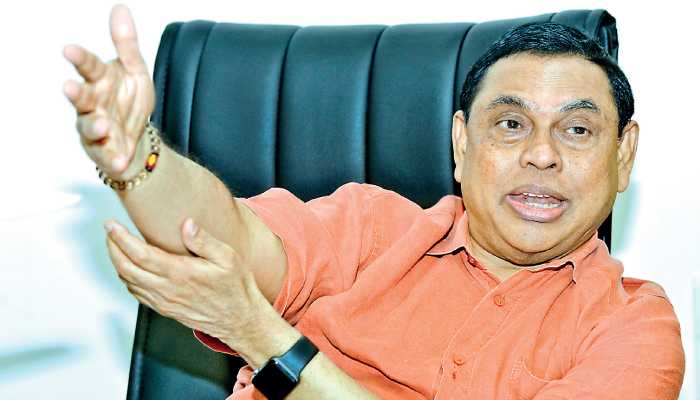
SLPP National Organiser Basil Rajapaksa – Pic by Daminda Harsha Perera
Sri Lanka Podujana Peramuna (SLPP) National Organiser Basil Rajapaksa speaks candidly on policies, growth challenges, the future of the party and why he is not certain of a two-thirds majority at the Parliamentary Election
By Uditha Jayasinghe
Q: How do you see the election campaign so far and what are your expectations?
Compared to the campaigns I have been involved in during my long political career since the 1970s, this is a dull campaign. The first reason is, normally after a Presidential Election, the subsequent poll has less momentum. People are not interested in the Parliamentary Election because they have already taken a decision on where the country should go. Therefore it is natural to see a lower voter turnout compared to the Presidential Election.
The second reason is the COVID-19 pandemic; obviously the public is a bit scared to actively come out and campaign. There are also a lot of regulations and barriers from the health authorities and the Elections Commission. All this has lulled election-related enthusiasm.
The third reason is the Opposition is divided, and their supporters are fed up with their own party and they don’t know what to do. It is the same for the JVP and the TNA. All political parties are divided and party members are frustrated; as a result they have become lazy.
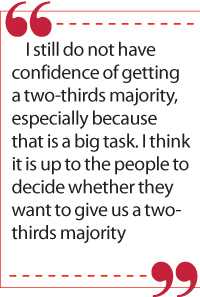 |
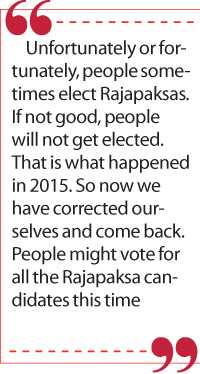 |
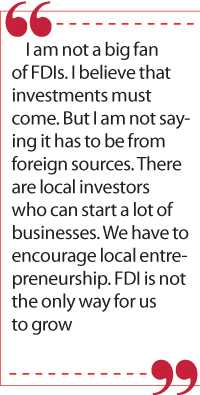 |
Q: Are you confident of a two-thirds majority?
Not yet. I still do not have confidence of getting a two-thirds majority, especially because that is a big task. I think it is up to the people to decide whether they want to give us a two-thirds majority.
Q: Are you concerned about minority support? What is your view of the criticism that the SLPP is not inclusive?
It might be one reason. But the main thing is the expectations of the people from President Gotabaya Rajapaksa’s Government and the SLPP. When a government is formed, people hope for a lot of things. To fulfil these expectations, we need a two-thirds majority. It will be easy once we have a clear mandate from the people. It is up to the people to give us a two-thirds majority, but if they give us this I can assure that the President will fulfil their expectations.
Q: You have said that if a two-thirds majority is achieved, the Government will not stop with just reversing the 19th Amendment, but will bring in a new Constitution. Has work already begun on this?
Our Party Chairman is a professor of law and he is the best person to do it. He and a team of people have already started doing this. I believe it has to be equal participation. We know for the first Constitution in 1972 Colvin. R. de Silva did a lot of ground work. But unfortunately that vanished in 1976 as former President J.R Jayawardena brought a new Constitution.
A Constitution needs pillars and frameworks. Unfortunately in the current situation these have been changed from time to time. The first biggest blow was the 13th Amendment. Then the 16th, 18th, and 19th Amendments. Every Constitution is like the foundation of a nation. But now ours is like a building where the foundation was built for something else and lots of floors have been added later. One day that building will collapse and people will die.
We are definitely dedicated to a new Constitution. But the problem is that the people have to give the mandate. If the people decide they don’t want to change anything, we have to listen to the people.
Q: Legal experts have pointed out the 19th Amendment empowering independent commissions is positive for democracy. Would you protect these safeguards?
Well, there are good things and bad things in everything. What we want to do is get all the good things and make a good Constitution.
Q: So you are pledging to preserve some of the good elements of the 19th Amendment?
Yes. Definitely not only the 19th Amendment, but what is good from the original Constitution. Some good things of the 1972 Constitution were included in the 1976 Constitution and those were also expanded.
Q: What will happen to the Executive Presidency?
That also has to be discussed and decided. I think there are good things within the Executive Presidency. The US President has used his Executive powers to deal with the COVID-19 outbreak in that country and some outcomes have been positive, so we have to see. If there are good things there, we have to use them. You talk about the independent commissions. My only worry is, do you want the commission to be independent or its members to be independent?
Q: But apart from the Elections Commission there are other commissions that are doing important work, for example the Procurement and Human Rights Commissions. Do you think these need to be scrapped as well?
The problem is some have interpreted that independence is for the members of the commissions. No. The independence is for the commission to act independently and work independently.
I am not blaming the Elections Commission or any other Commission. But I think this has to be clearly interpreted in the Constitution or in the relevant regulations. But now some people think that independence means the individual members can act independently. This is not so. Take, for example, the independence of your newspaper. What does that mean? Is it your independence to write? Your Editor’s independence? Or the owner’s independence? This is a debatable thing.
Q: Linked to the issue of transparency and governance is the Right to Information Act. Will the SLPP preserve this piece of legislation?
Yes, of course. I have benefited from it.
Q: Clearly once elections are over the biggest challenge will be the economy. What are your plans to spur growth?
COVID-19 is the biggest challenge we have faced in the past 70 years. I think the first challenge was saving people from COVID-19 and then also protecting their livelihoods. President Gotabaya Rajapaksa’s Government saved lives.
We need foreign currency to repay debt and finance imports. We don’t have oil, so we need foreign currency for that. The third thing is medicine and raw materials for our industries. Then there are other consumer items that we have to import. For all these we need foreign currency.
We have had negative trade balances from the 1940s. Until COVID-19 our key foreign exchange earnings were from remittances, apparel and tourism. From March there have been no tourist arrivals and therefore no income from that sector. Remittances have also dropped drastically.
But we have to face this challenge, so we thought that we have to try something else. We saw that Brazil was one of the biggest suppliers of chicken to the world, but they have an issue at the moment so we thought ‘why don’t we try exporting chicken?’ Then we exported flowers, ornamental fish, vegetables and other products.
In the apparel sector we thought, ‘why can’t we produce our own fabric?’ Then we thought of making masks. By boosting production in this manner we immediately achieved a ‘V’ shaped recovery. In June our exports almost came to last year’s amount; I think we might be able to exceed that in July. However, it is a hard task.
From the beginning of the lockdown the President allowed the continuation of agriculture activities and all other main livelihood activities. In paddy farming, we have taken steps to issue water. We spoke to farmers and issued fertiliser and resumed tea plucking and rubber tapping. Then we went for an online tea auction. Fisheries activities were allowed, as were livestock activities. MILCO continued its operations. All essential services functioned well.
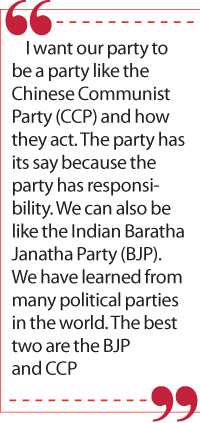 |
 |
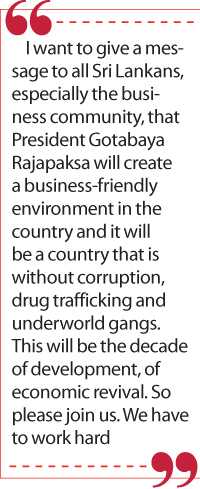 |
Q: But economic growth is projected to be only 1.5% this year and economic experts have warned import substitution will not result in strong growth long term and have advocated for reforms. Will this be a Government priority?
Most of these things have been straightened out. In terms of public sector service deliveries, much has been done to address constraints and help investors. But there are legislative things such as environmental approvals that have to go through the normal procedure, because sustainability is very important. We have to be concerned about the environment.
Other than that, if there is delay in registering of companies or getting some technical requirement that has been delayed, we have to straighten it out and we will do so.
Q: One of the key challenges during previous governments, even before 2015, has been attracting FDI. Do you have any plans for the next five years to change that track record?
Actually if you look at the FDIs during President Mahinda Rajapaksa’s period, there was an increase of FDIs. I am not a big fan of FDIs. I believe that investments must come. But I am not saying it has to be only foreign sources. There are local investors who can start a lot of businesses. Even now there are very big investments going on. We have to encourage local entrepreneurship. FDI is not the only way for us to grow.
Q: We have sizeable debt repayments next year as well; is there any strategy on how to tackle that?
Yes, we will. One key thing is to keep the exchange rate stable. We are also discussing with some bilateral creditors on whether we can have some type of understanding on loan repayment timelines or loan adjustments. We have to have that. It is like when the client is in trouble, the bank should help them.
Q: Will a Rajapaksa Government move Sri Lanka’s foreign policy closer to China?
Who sold the Hambantota Port to China? It was not us. Investment is something else. You already asked about FDIs. So FDIs require people and companies with money. We are open to investment from different countries. If you see skyscrapers in Colombo, they are from various countries.
Q: What are the Government’s plans regarding the East Container Terminal? Will India remain part of its development?
We have to obey some of the agreements but we are discussing to make it more flexible and also more favourable to Sri Lanka.
Q: What do you hope to do differently from the pre-2015 Government if you win on 5 August?
We would like to not have Mervyn Silva and the like again, that is one thing (laughs).
Q: In terms of policies?
In terms of policies, I don’t think there should be many major changes. We can cut down our expenses and reduce corruption. We should eliminate drugs and underworld gang member activities. I think the President will do that very well.
Q: So it could be a very law-and-order-focused Government?
Law and order does not mean that you have to punish everybody and put them in jail for minor offenses like jaywalking. First start from the biggest ones, the drug traffickers, the underworld. Those are the biggest things we have to get rid of. The latest issues in the Police Narcotics Bureau are very, very concerning.
Q: What are your views on judicial independence, and will you continue key cases that were begun during the previous administration?
I am a victim of such cases. I don’t want to talk about my cases but I know many of them were politically motivated. However, they are judicial matters and I do not want to talk more about them. I am very confident that these were politically motivated. It was all done by the political leadership, they decided who to persecute.
I am entitled to justice and they have to pay compensation to us. I don’t think any underworld person has given fingerprints as much as I have. I have been fingerprinted more than 15 times.
Q: Do you think judicial independence should be taken forward?
The Judiciary has to be independent. We have to establish independence. Ranjan Ramanayake’s telephone conversations show the need for independence.
Q: Many have questioned the decision to include former President Maithripala Sirisena in your coalition. Isn’t he more of a liability than an asset?
I don’t think so, because any political party coming into a coalition is good for the alliance.
Q: Is there are a possibility that ex-President Sirisena might get a ministerial portfolio?
Let’s see how it goes. In this election it is not only the party, it is also about the preferential votes as well. After results are in, the President and the Prime Minister will decide who the ministers will be.
Q: In terms of the alliance, isn’t there already a decision on how the ministerial portfolios will be divided between the SLPP and SLFP?
No.
Q: What is your response to people who say voting for the Rajapaksas is a return to family rule?
Always, unfortunately or fortunately, people sometimes elect Rajapaksas. If not good, people will not get elected. That is what happened in 2015. So now we have corrected ourselves and come back. People might vote for all the Rajapaksa candidates this time.
Q: You say you have corrected yourselves. How?
The people gave us a verdict that we were wrong, so we had to go. So we went. We studied it and we corrected ourselves. There are no more Mervyn Silvas or Sajin Vasses in our party.
Q: Did the change include clean governance?
Definitely. No corruption under the leadership of President Gotabaya Rajapaksa. Our party also removed four Chairmen of Local Government bodies. These days we are very careful because this is the election period and we don’t want to damage any candidates. After that we will take action if there are any complaints
Q: Even regarding the Kurunegala Mayor?
I don’t want to mention anything at this time.
Q: What are your future plans? Any intentions of returning to Parliament?
Since 2015 I have seen a different way on how to be in politics without going to Parliament. I see some other people have now also started doing the same. It is a trend I started by not going to Parliament. I have made a political party, won two national elections, and now a third which we will also win. So you can do lots of things without going to Parliament. So I am very happy. I see Mangala Samaraweera has taken a similar path. Let all people try to do that.
Q: Given it is a relatively young party, how would you like to see the SLPP evolve?
Let the people understand and decide. I want our party to be a party like the Chinese Communist Party (CCP) and how they act. The party has its say because the party has responsibility. When a minister is appointed by the people, the MPs can come, but ministerial portfolio is given by the President and the Prime Minister. We can also be like the Indian Baratha Janatha Party (BJP). We have learned from many political parties in the world. The best two are the BJP and CCP.
Q: Any message to the private sector?
I want to give a message to all Sri Lankans, especially the business community, that President Gotabaya Rajapaksa will create a business-friendly environment in the country and it will be a country that is without corruption, drug trafficking and underworld gangs. This will be the decade of development, of economic revival. So please join us. We have to work hard.